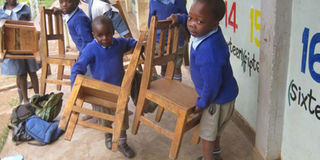Education reforms ought to be done with all cards on the table

Lower primary pupils in a city school. The new curriculum emphasises on equipping learners with skills in communication, digital literacy, critical thinking, creativity and imagination, among others. PHOTO | SAMMY KIMATU | NATION MEDIA GROUP
What you need to know:
- That only 11 per cent of the children who sat KCSE last year are eligible to join university signals a downward trajectory and a ballooning base of a failing mass of learners.
Over the years, exam results in Kenya have repeatedly shown that learners are not adequately exposed to knowledge.
We hurriedly implemented FPE without looking at the requisite ingredients to make it produce quality graduates.
By fixing education, we may, in turn, fix devolution since education affects every household.
Over the past year, the probity of Kenya’s education system has been called into question in a manner hitherto unseen.
For the first time in the country, parents, guardians and other stakeholders are consistently questioning the value of investment made vis-a-vis the return on investment in education.
The question is, what value was obtained from the 600,000 learners who failed the school leaving examination despite huge investments in their 12 years of learning.
That only 11 per cent of the children who sat KCSE last year are eligible to join university, down from 15 per cent in 2016, signals a downward trajectory and a ballooning base of a failing mass of learners.
For an education system to claim efficiency and effectiveness within its investment model, three things must stand out: Wastage management processes, teacher quality and functional accountability frameworks.
SKILLS
Over the years, exam results in Kenya have repeatedly shown that learners are not adequately exposed to knowledge, reason, skills, appropriate attitude formation and values embodied in the curriculum.
With the introduction of subsidies in schools this year through the free secondary education programme, we are waking up to the reality that 70 per cent of the learners are functionally illiterate. In other words, we are transferring a problem from primary school to secondary school (with our desire to obtain 100 per cent transition) with the hope that it will somehow decimate.
It is official that many primary school learners cannot read basic sentences, perform elementary operations in numeracy or identify, interpret, create or communicate using printed and written materials. Nonetheless, we expect them to pass KCSE as they finish the secondary school cycle.
The 2017 KCSE cohort joined primary school in 2005 and it is a ‘fine product’ of the Free Primary Education (FPE) programme introduced in 2003.
QUALITY GRADUATES
The KCSE results of 2015, 2016 and 2017 should have jolted us to reality. We hurriedly implemented FPE without looking at the requisite ingredients to make it produce quality graduates.
The desire to have secondary school students covered under NHIF is noble but the question is: Is that the most essential investment in secondary school education at this point in time? We should worry about if we have enough quality teachers. Have we adequately invested in infrastructure to absorb the larger numbers transitioning into secondary school?
The de-localisation of secondary school leadership is welcome but more consultations were necessary.
Players in the sector need to redefine upward and downward accountability and develop frameworks that will hold the sector to account.
The recent National Steering Committee meeting made helpful and forward-looking resolutions. That was necessary to cushion the cabinet secretary, whom the public now perceive to be issuing edicts that are not grounded on research since the Education Management Information System (Emis) is moribund.
TRANSFORMATION
Education is a tool for transformation and liberation and households are spending in excess of 60 per cent of their income on it.
That is why the sector must be made efficient and more effective.
By fixing education, we may, in turn, fix devolution since education affects every household. Only 12 years to Vision 2030 targets, education needs to find its place in steering the nation towards these development milestones.
The reforms are good tools to get the nation out of the rut of politics, abrasiveness and single-framing of national issues.
The ministry needs to climb down from the pedestal and engage stakeholders with all cards on the table.
The sector needs to engage honestly to seal the leaks and eliminate system capture of resources so as to ensure more is obtainable at the point of service delivery.
Mr Wesaya is the country director, Discovery Learning Alliance-Kenya. [email protected].





